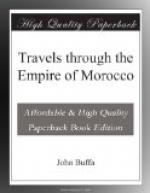The streets of this town are not paved; and the soil being clay, they must be very disagreeable in winter; for, after a heavy shower of rain, they are almost impassable from the accumulation of mud in every quarter. The market-places, with which this place abounds, are long, narrow, arched or covered streets, with small shops on each side, superintended by a Cadi, and an officer under him, for the purpose of collecting the duties on the sale of goods, &c. The chief furniture of the houses consists of beautiful carpets, cushions, and mattresses, upon which they sit and lie.
In and about the neighbourhood of this place are several saints’ houses, near which no Christian, nor Jew, is allowed to pass. The most remarkable is the hospitium of Sidi-el-Marti.
The Emperor’s favourite diversions, while here, are shooting and hunting, in both of which I am told he excels. He keeps a large pack of greyhounds, as fine as any I have seen in England. His pleasure-grounds, and park, in the vicinity of this town, abound in all kinds of game, hares, rabbits, and deer, and in wild boars and foxes.
LETTER XVI.
Courtship—Marriage—
Mequinez.
I shall now give you an account of the manner in which the marriages are invariably negotiated and conducted in this country. A female, the confidential friend of the suitor, is dispatched to observe and report the beauty and accomplishments of the young lady; and when those are found to be perfectly adapted to the gentleman’s taste, she is further delegated to sound his eulogium, and by every means, such as presenting her with valuable jewels, &c. to ingratiate him in the good opinion of the fair one. When this curious courtship ends, by terms being agreed upon, the destined bridegroom pays down a sum of money to the bride, a license is taken out from the Cadi, and the parties are married. I send you a description of a marriage-ceremony, at which I was present the other day.
The bridegroom (who is one of the officers of the household) came out of his house, attended by a vast number of his friends, and mounted one of the best horses belonging to the Emperor, most curiously and richly caparisoned. He carried his sword unsheathed, and was preceded by a splendid standard, and a band of music; he was followed by a kind of palanquin, supported on the shoulders of four stout black slaves, a detachment of cavalry firing off their pieces every minute, and a procession of relatives and friends, the whole moving with great mirth and jollity,
Before they reached the house of the bride, the cavalcade halted, and the bridegroom dismounted, assisted by his negro slaves, and knocked loudly at the door three times. The lady was brought out in a covered chair, attended by four women, completely muffled up. The whole party of the bridegroom turned their backs, and she was smuggled into the palanquin: they then returned in the same style to the house of her lord, where, before she was allowed to enter, he placed himself at the entrance, and extending his right arm across the door-way, she passed under, as an indication of her voluntary and unconditional submission to his will and pleasure.




